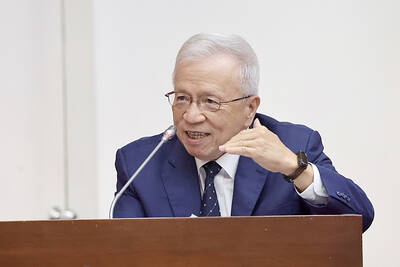China’s passenger car sales growth slowed last month as inflation accelerated, reducing consumers’ spending power in the world’s largest auto market.
Sales of cars, sport-utility vehicles and multipurpose vehicles rose 10.9 percent from a year earlier to 839,228 last month, the China Automotive Technology and Research Center said yesterday. That compares with 34 percent growth in April and 25 percent in May, the center said.
China’s inflation rate accelerated in May to an annual 3.1 percent, the quickest in 19 months.
Measures to slow the economy may weigh on auto sales after government stimulus measures boosted demand to a record high last year, Tim Dunne, an analyst at J.D. Power and Associates, wrote in a report on Tuesday last week.
“The government will continue its tightening measures to cool down the economy in the second half of the year,” Dunne said. “We therefore expect vehicle sales to slow to a more sustainable pace following what has largely been incentive-driven strong growth.”
China’s economy expanded 11.9 percent in the first quarter. China International Capital Corp (中國國際金融) has said it expects growth to slow to 7.5 percent by the fourth quarter.
Last month’s increase in passenger vehicle sales is the slowest since the research center began publishing monthly data in April. Passenger car sales expanded 25.6 percent to 5.42 million, it said.
The China Association of Automobile Manufacturers (中國汽車工業協會) will publish separate sales data for last month later this month. Passenger vehicle sales in June last year rose 48 percent from a year earlier, it reported at the time.
According to the association’s data, monthly sales have risen more than 10.9 percent for 14 straight months through May.
China’s vehicle deliveries may rise 17 percent this year to 16 million, and annual demand for automobiles may eventually exceed 30 million, according to the State Information Center.
Total vehicle sales, which include buses and trucks, increased 14 percent last month to 1.13 million, the research center said yesterday. They rose 30.5 percent in the first half of the year to 7.19 million.
China continued to lead the US in total sales in the first half, with US deliveries rising to 5.6 million during the period.
Production in China at Toyota Motor Corp, Honda Motor Co and Nissan Motor Co, Japan’s three largest carmakers, was disrupted last month as workers at Denso Corp and other component suppliers in the country went on strike for higher wages.
At least eight strikes since the middle of May forced suppliers to Toyota, Honda and Nissan in China to raise wages, raising carmakers’ costs.
Automakers continue to invest in China. SAIC Motor Corp (上海汽車), the nation’s largest, said on June 25 it aimed to raise as much as 10 billion yuan (US$1.48 billion) in a private share placement to fund expansion.
The carmaker plans to sell 180,000 of its own-brand vehicles this year, president Chen Hong (陳虹) said in March. That compares with an overall sales target of 3 million for all SAIC-made vehicles.

JITTERS: Nexperia has a 20 percent market share for chips powering simpler features such as window controls, and changing supply chains could take years European carmakers are looking into ways to scratch components made with parts from China, spooked by deepening geopolitical spats playing out through chipmaker Nexperia BV and Beijing’s export controls on rare earths. To protect operations from trade ructions, several automakers are pushing major suppliers to find permanent alternatives to Chinese semiconductors, people familiar with the matter said. The industry is considering broader changes to its supply chain to adapt to shifting geopolitics, Europe’s main suppliers lobby CLEPA head Matthias Zink said. “We had some indications already — questions like: ‘How can you supply me without this dependency on China?’” Zink, who also

At least US$50 million for the freedom of an Emirati sheikh: That is the king’s ransom paid two weeks ago to militants linked to al-Qaeda who are pushing to topple the Malian government and impose Islamic law. Alongside a crippling fuel blockade, the Group for the Support of Islam and Muslims (JNIM) has made kidnapping wealthy foreigners for a ransom a pillar of its strategy of “economic jihad.” Its goal: Oust the junta, which has struggled to contain Mali’s decade-long insurgency since taking power following back-to-back coups in 2020 and 2021, by scaring away investors and paralyzing the west African country’s economy.

BUST FEARS: While a KMT legislator asked if an AI bubble could affect Taiwan, the DGBAS minister said the sector appears on track to continue growing The local property market has cooled down moderately following a series of credit control measures designed to contain speculation, the central bank said yesterday, while remaining tight-lipped about potential rule relaxations. Lawmakers in a meeting of the legislature’s Finance Committee voiced concerns to central bank officials that the credit control measures have adversely affected the government’s tax income and small and medium-sized property developers, with limited positive effects. Housing prices have been climbing since 2016, even when the central bank imposed its first set of control measures in 2020, Chinese Nationalist Party (KMT) Legislator Lo Ting-wei (羅廷瑋) said. “Since the second half of

AI BOOST: Next year, the cloud and networking product business is expected to remain a key revenue pillar for the company, Hon Hai chairman Young Liu said Manufacturing giant Hon Hai Precision Industry Co (鴻海精密) yesterday posted its best third-quarter profit in the company’s history, backed by strong demand for artificial intelligence (AI) servers. Net profit expanded 17 percent annually to NT$57.67 billion (US$1.86 billion) from NT$44.36 billion, the company said. On a quarterly basis, net profit soared 30 percent from NT$44.36 billion, it said. Hon Hai, which is Apple Inc’s primary iPhone assembler and makes servers powered by Nvidia Corp’s AI accelerators, said earnings per share expanded to NT$4.15 from NT$3.55 a year earlier and NT$3.19 in the second quarter. Gross margin improved to 6.35 percent,